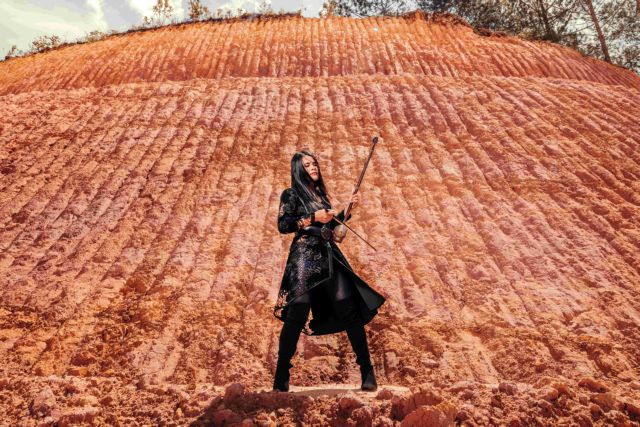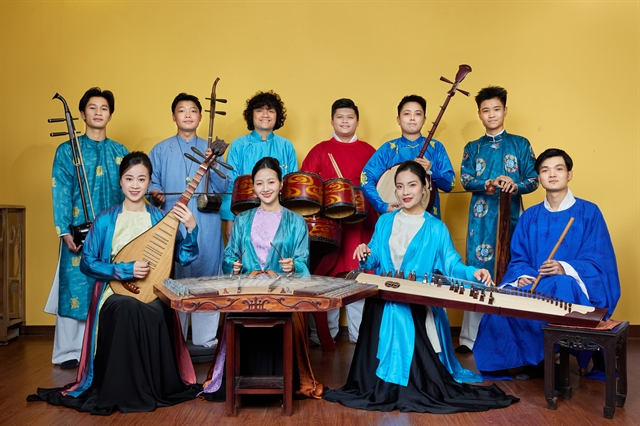 Life & Style
Life & Style

Ngô Hồng Quang is a contemporary folk musician who travels the world performing compositions that mix traditional and modern Vietnamese elements. He recently returned to Việt Nam to support and promote the premiere of the new traditional music band Thiên Thanh and organise the first show of the band Về Kinh Bắc (Return to Red River Delta region).
Việt Nam News reporter Trần Khánh An talks with Quang about his plans.
 |
| MEET THE FOLK-ER: Musician Ngô Hồng Quang. Photo courtesy of Ngô Hồng Quang |
Inner Sanctum: Why have you returned to Việt Nam to debut the new traditional band Thiên Thanh?
I wandered around the world for a long time. As soon as I got back to Việt Nam, I had a strong feeling that I needed to do something for my country. By chance, when I came back to Hà Nội, I saw a few artists performing folk songs. That is when I had the idea – and a strong desire to do it immediately – to debut a traditional music band with a contemporary approach.
The desire comes deep from my heart, as I want to make the national music and the culture of the Vietnamese people widely recognised. It's a continuation of my previous work, but specifically in my home country. This is no longer a solo effort because I have other musicians and artists to accompany me and more Vietnamese audiences be exposed to folk music.
Inner Sanctum: How do you see the traditional music scene here, and how can you improve it?
Exposure to folk music is declining among the public due to a lack of innovation and the continued usage of antiquated techniques. If nothing changes, how can it engage with the next generation and the outside world?
Traditional music needs to keep moving; it cannot just remain unchanged like an artefact in a museum – it needs to keep up with current music. So, I want to adapt traditional music to be more appealing to the younger generation and more international.
With Thiên Thanh, I have added new elements, including arrangement, harmony and different rhythmic genres suitable for contemporary musical aesthetics. I hope to continue this way and succeed.
For example, I re-arranged the pentatonic scale of Quan Họ (folk singing of the Red River Delta) into a scale that is more familiar and contemporary. I instruct the band’s members on how to play the 5/4 and 7/8 beat, as well as how to put sharp and flat notes to match the harmony.
I also worked with beatboxer Trung Bảo and American cellist Bryan Charles Wilson on Thiên Thanh's first show to create a fresh and vibrant musical for the young generation. This blend of the local and the international creates a dynamic, multifaceted music that continually evolves and innovates.
 |
| ENSEMBLE: Musician Ngô Hồng Quang (third from left, back row) and members of Thiên Thanh Band. The band's young line-up has an innovative approach to music, fusing contemporary and traditional styles. Photo courtesy of Thiên Thanh Band |
Inner Sanctum: What is Thiên Thanh’s vision for the future?
Following the first show in May depicting quintessential features of folk music of the Red River Delta region, the band members and I will go to the studio and record all 12 songs we play at the show. We will call the album Người Kinh Bắc (Red River Delta Folks) to document the effort we have completed over the last three months. Every song on the album will have a music video, which can be seen as a way to promote the nation's culture.
The next project is to promote music from other regions and ethnic minorities, not just the Red River Delta, but also the Northwestern, Northeastern, and Central Highlands.
I intend to combine new instruments, such as the pí (ethnic Thái people's flute) and khèn (ethnic Mông's panpipes), with some of the existing ones of the Kinh majority people. My long-term goal is to publicise Vietnamese folk music in general with a more contemporary vibe.
Inner Sanctum: In what way are you going to publicise Thiên Thanh?
In the future, I hope the band will become more widely recognised. I think many people will be interested in it, especially those that value culture. This will open up opportunities for the band to embark on tours and perform publicly. This is another way of increasing our income. Ensuring artists receive compensation and a good livelihood is essential. For them to retain cultural value, they need to be financially secure.
I will try to include the band's music in tourism-related products to promote the culture. It will be wonderful if there is a tourism project, as it will increase the band's income and allow Vietnamese traditional music to be heard by a larger audience.
Additionally, it's an excellent approach to get the next generation interested in practising folk music. Folk music should be extensively played in public places and should not only be performed in theatres. I want to make sure that the music I write and our band's performance is of the greatest quality. VNS




